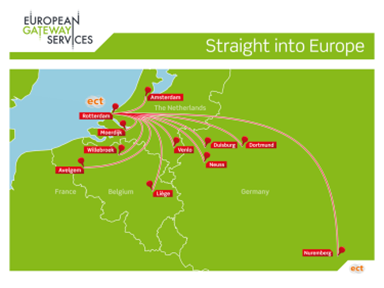Multi-level and multi-agent control of intermodal container transport systems
Background and problem definition
Due to the increasing demand for container transport in national and international trade, hinterland haulage among major deep-sea ports and the containers' original/final inland locations has become an important component in modern logistic systems. Intermodal container transport integrates the use of different modalities (e.g., trucks, trains, barges, etc.) during the container delivery process to improve the efficiency and sustainability of hinterland haulage. One crucial challenge for hinterland haulage is to provide reliable transport services in a cost and time-efficient way with the existing transport infrastructures while considering physical capacities and environmental regulations. during the handling of the bulk material.

Goal
The aim of this research is to investigate how containers can be transported efficiently over intermodal container transport networks including the Port of Rotterdam and hinterland terminals.
Approach
The proposed research approach is to improve the operational performance of the intermodal container transport network via better real-time coordination. To implement the proposed research approach, two main tasks are considered:
- In the modeling task, dynamic intermodal container transport network models are developed. The models capture the characteristics of intermodal container transport, e.g., modality changes at intermodal terminals, due time requirements for container transport, capacity constraints of terminals and transport connections, etc.
- In the control task, the main work is to develop real-time and coordinated intermodal container flow assignment methods. A distributed and coordinated model predictive control methodology will be applied for real-time and coordinated container flow assignments over intermodal container transport networks while considering capacity constraints, modal split targets, information privacy, etc.
Funding
This research is supported by the China Scholarship Council under Grant 2011629027 and the VENI project "Intelligent multi-agent control for flexible coordination of transport hubs" (project 11210) of the Dutch Technology Foundation STW, a subdivision of the Netherlands Organization for Scientific Research (NWO).
Contact
PhD Candidate: L. Li, MSc
Daily supervisor: Dr. R.R. Negenborn
Thesis supervisor: Prof.dr.ir. B. De Schutter